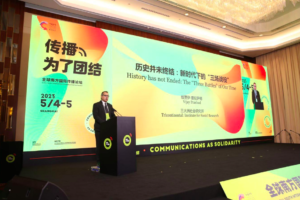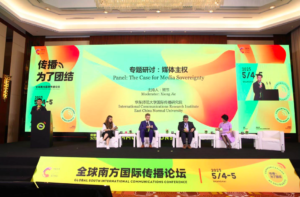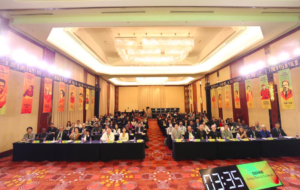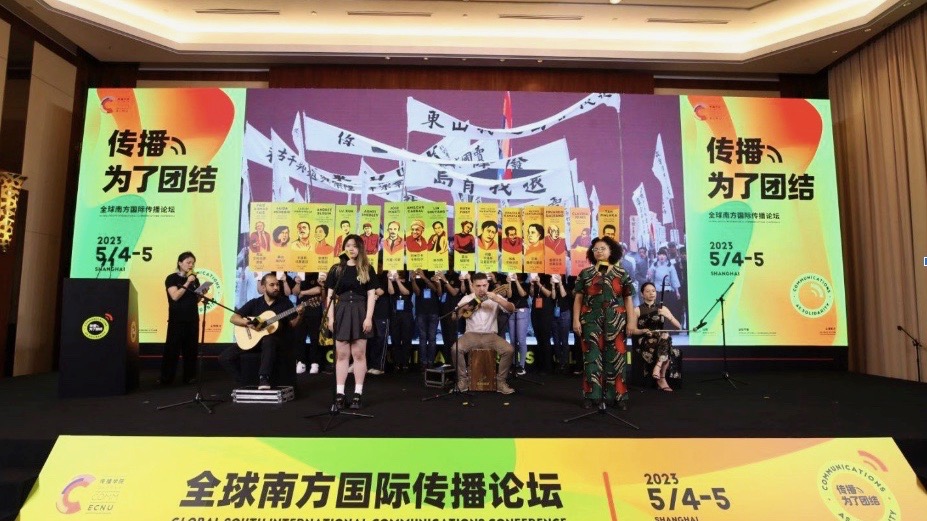“The conflict imposed by the United States [on China] is partly due to the decline of Western control over science and technology. Gradually, neocolonial control over finance, resources, and science and technology has been exhausted, but the neocolonial structure remains with respect to Western control over weapons and information systems,” said Vijay Prashad, director of the Tricontinental: Institute for Social Research and Chief Correspondent of Globetrotter, at the opening of the “Communication as Solidarity” conference, organized by the School of Communication at East China Normal University along with several other Chinese entities in Shanghai.
Besides representatives from Press TV, TeleSUR, RT, and CGTN, the event also included members of progressive media organizations such as Pan African TV, ArgMedios, and Brasil de Fato, and over 100 researchers and media professionals from China, Ghana, Zambia, South Africa, Brazil, and Russia.
Prashad said that Western powers have almost absolute control over information systems. “This control is exercised through Western domination of infrastructure, such as fiber optic cables, and human networks of information production, and through the ideological power of Western media established during colonial times.”

One of the hosts of the meeting, Lu Xinyu, of the newly formed International Communication Research Institute at East China Normal University, said that the movement for a new order in the 1970s tried to solve the problem of the unbalanced global media structure, but failed. “So today we hope to have a new understanding of this issue: One aspect is the domination of the media by the West. That requires that we, the media and media organizations of the global South, work together.”
Targets of sanctions and censorship by the Global North
The conference was attended by representatives of media organizations that have faced the brunt of censorship.
In 2010, US State Department documents leaked by WikiLeaks revealed that the UK Foreign and Commonwealth Office had told the US embassy that the British government was “exploring ways to limit the operations of the IRIB’s Press TV service.”
In the document, the British chancellery stated that national and international law did not permit the withdrawal of Press TV’s license, but that a possibility could be open if more sanctions were imposed on Iran.
Finally, in 2013, the Iranian state channel’s license was revoked in the UK for allegedly violating the country’s Communications Act. In the following years, the media outlet suffered several blocks on its YouTube and Gmail accounts, was banned from Facebook, had its website https://presstv.com/ confiscated, and late last year, the French satellite operator Eutelsat decided to take the channel off the air.
At different levels, many of the media organizations present at the meeting have been facing censorship, blockades, and sanctions imposed by the United States and Europe or right-wing governments, as in the case of TeleSUR.
The multi-state-owned platform has already been removed from the programming of the National Telecommunications Corporation, a state-owned channel in Ecuador in 2018 under Lenín Moreno. After the coup against Evo Morales in Bolivia in 2019, the state-owned Entel under the de facto government of Jeanine Áñez, suspended the broadcast of the channel founded by Hugo Chávez.
In 2021, the UK withdrew CGTN‘s license on the grounds that it is directly controlled by a political party, which is not allowed in the country. RT, on the other hand, has been banned from all European territory and from platforms such as YouTube. The Spanish version of the channel on that platform had six million followers until it was taken down.
In a debate about the search for sovereignty for the Global South media, the president of TeleSUR, Patricia Villegas, defended the need that the countries to develop their own platforms, such as satellites, servers, and social networks. “The content we’ve been building relies on borrowed highways that are owned by others who define and change the rules, block you whenever they want, according to the interests that they defend. So, if we want to continue to tell what really happens in each of these territories, we have to fight to build our own highways.”
::: TeleSUR: understand the importance of the channel idealized by Chávez :::
For the director of Brasil de Fato, Nina Fideles, the conference was significant “by the very fact of bringing together, over two days, people and media outlets from different countries, who could share experiences and ideas about communication from the Global South.”
“Besides the fact that we had the opportunity to learn more about the Chinese experience in relation to communication, we also learned about the economic and social model here and the country’s role reorienting the global geopolitical situation,” added Fideles.

The founder of the Post in Zambia, Fred M’membe, said that the meeting between the different media outlets was trailblazing. He also commented that media like TeleSUR, RT, and CGTN, among others, have a great responsibility to use the knowledge and resources they have to help create a new kind of media, a new way of communication. “Our adversaries, those who want to continue with the ideas of exploitation and humiliation of others, are investing billions of dollars around the world to consolidate their ideas of dominating the world,” said M’membe, who is also president of the Socialist Party of Zambia.
Progressive media and Pan-Africanism
Another axis of debate at the conference was the media scenario on the African continent, as well as the Pan-African agenda. Kambale Musavuli, director of Pan-African TV, said that Pan-Africanism has been taking root in the African continent and that the role of progressive media is essential to the project.
“We have achieved Pan-Africanism at the political level by bringing the countries of the African Union together, but now we need the Pan-Africanism among the people. Where are the people? They are in the rural communities, and to reach them you need the media, radio, television, and newspapers. We are using the media, especially TV, to reach the people in remote areas. So, using community radio stations, using television stations run by progressive organizations, it will be possible to spread this vision of a united Africa under Pan-Africanism,” Musavuli explained.
Kwesi Pratt Jr., founder of the channel, said that Africa’s image and history are permanently distorted by the hegemonic media. “There is a hysteria all over the world that prevents us from choosing our own friends and deciding our own destiny. The African reality today is: Those who colonized and enslaved us are exploiting and stealing our resources to maximize the profits of multinational corporations instead of developing Africa. This is the story we need to tell and we need to tell it in our own way, using our own instruments,” he said.

The conference saw the official inauguration of the International Communication Research Institute of East China Normal University, which will have Lu Xinyu as dean.
This new institution seeks to contribute to the development of multi-level and multi-channel international communication platforms and networks for the countries and regions in the Global South.





